30 Sep 2010
A Day Spent Reflecting on Transition and the Big Society
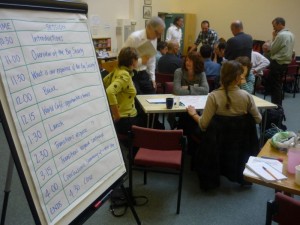 Over 40 people came together in Bristol on Wednesday to explore what the government’s Big Society agenda might mean for Transition initiatives. The venue was the Unitarian Church Hall, and the day proved to be very focused and yielded much insightful thinking and useful ideas. What follows is my attempt to produce a clear record of the event, the ideas and the debates, as well as the suggestions for where this might go next, dragged from my illegible notes, so any mistakes or misrepresentations are entirely my own doing.
Over 40 people came together in Bristol on Wednesday to explore what the government’s Big Society agenda might mean for Transition initiatives. The venue was the Unitarian Church Hall, and the day proved to be very focused and yielded much insightful thinking and useful ideas. What follows is my attempt to produce a clear record of the event, the ideas and the debates, as well as the suggestions for where this might go next, dragged from my illegible notes, so any mistakes or misrepresentations are entirely my own doing.
Attendees came from a range of organisations, as well as from Transition initiatives across the country. The day was run using Chatham House Rules, meaning that what was said could be reported, but nothing could be attributed to particular people, which I will bear in mind in what follows. After introductions, Peter Lipman, Chair of Transition Network (who I don’t think will mind my attributing these particular words to him…), gave an overview of the Big Society to frame the discussions for the day.
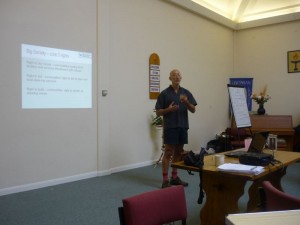 He said that he became concerned that the Big Society idea was being rolled out and nobody seemed to be taking much notice of it, and that this day was inspired by a desire to understand it better and from a deep concern about what it coming towards us. He began by distilling out 3 underlying ideas that appear to be central to the thinking behind the Big Society:
He said that he became concerned that the Big Society idea was being rolled out and nobody seemed to be taking much notice of it, and that this day was inspired by a desire to understand it better and from a deep concern about what it coming towards us. He began by distilling out 3 underlying ideas that appear to be central to the thinking behind the Big Society:
- that state intervention and regulation, which were intended to promote social cohesion actually erode it.
- that the community and voluntary sector is better placed to improve society than the state, and
- that the private sector can help to ensure that it is done efficiently, and finally that there are no rights without a responsibility to consider the rights of others.
One of the more dubious philosophical tenets that underpins it is the idea that business is fundamentally benign. The Big Society is founded on 3 key proposals:
- radically reforming the public sector (what the state can do for you)
- community empowerment (what we can do for ourselves)
- philanthropic action (what we can do for others)
The government is proposing to train 5,000 Big Society trainers, but at a recent talk in the South West, those attending were told, following a question about how these trainers will be paid/funded, were told that once trained they would need to find their own funding! The Big Society is intended to introduce, through forthcoming legislation including the Localism Bill, 3 core rights:
- The Right to Buy
- The Right to Bid
- The Right to Build
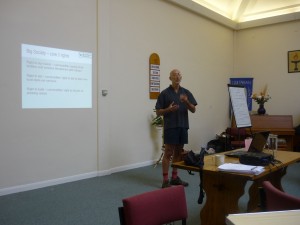 While the rhetoric, Peter said, is about empowering society, the reality, once the cuts to be outlined in the Comprehensive Spending Review start to impact, could feel very different. While localism offers more influence for local people, it also offers a potentially greater role to NIMBY voices, and the proposal for planning gain to go direct to communities could lead to communities being ‘bought out’ by large developers. The government is also launching what it calls the ‘Responsibility Deal’, a “partnership between government and business which balances proportionate regulation with corporate responsibility”. Handing more power to business is a potential contradiction in terms of also trying to empower communities, it is not, by any means, an even playing field.
While the rhetoric, Peter said, is about empowering society, the reality, once the cuts to be outlined in the Comprehensive Spending Review start to impact, could feel very different. While localism offers more influence for local people, it also offers a potentially greater role to NIMBY voices, and the proposal for planning gain to go direct to communities could lead to communities being ‘bought out’ by large developers. The government is also launching what it calls the ‘Responsibility Deal’, a “partnership between government and business which balances proportionate regulation with corporate responsibility”. Handing more power to business is a potential contradiction in terms of also trying to empower communities, it is not, by any means, an even playing field.
This is also all being presented in the context of deep cuts in public spending. The government has undoubtedly inherited huge debts, and is arguing that it has no choice other than cutting the state back, while presenting it as a good thing because the Big Society can fill the gap. He concluded by presenting what he saw as the threats it presents as well as some opportunities, although admitting that his list of the former was much longer than the latter…. . The threats were;
- That locally driven agendas could ignore wider societal goals (particularly climate change)
- Poor engagement and consultation could mean that agendas are set by vocal minorities
- Removal of state intervention and funding without real provision for needed projects
- Councils, such as is already being seen with Suffolk County Council, outsourcing all their services to the private sector.
The opportunities, he stressed, were still vague, but might be the potential for motivated, engaged communities to radically reshape themselves.
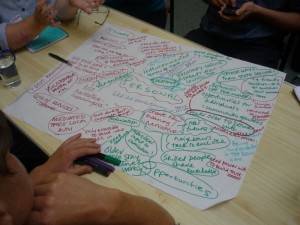 There then followed a discussion about what Peter had said. One person said that they remembered how prior to 1979, there had been much community work happening, but that after the election, many of those involved shifted their focus to opposing government and protecting public services. Another commented that the Big Society doesn’t appears to have anything underneath it, that those responsible for it appear to have very little in their heads about what this all means. Another remarked that it would be a mistake for government to have all the narrative on this, and for us to only think in terms of opposition.
There then followed a discussion about what Peter had said. One person said that they remembered how prior to 1979, there had been much community work happening, but that after the election, many of those involved shifted their focus to opposing government and protecting public services. Another commented that the Big Society doesn’t appears to have anything underneath it, that those responsible for it appear to have very little in their heads about what this all means. Another remarked that it would be a mistake for government to have all the narrative on this, and for us to only think in terms of opposition.
For some, there are opportunities for Transition in terms of voluntary organisations collaborating with the private sector to deliver services, such as energy saving workshops and services. It was also remarked that while engagement with aspects of the Big Society might be beneficial, it is important to distinguish between that and the bigger picture nationally.
Then representatives of three organisations gave their perspective on the Big Society. The first stated that her experience has been that there is, within government, an amazing lack of clarity with little cross-departmental co-ordination. Decisions are being made “frighteningly quickly” with no thinking about the implications, government officials are bewildered and overwhelmed. All the ‘quangos’ and processes that enabled thinking across departments have been abolished. The trouble with devolving power, first to local government and then to communities, is that government officials don’t ‘get’ community engagement. Initiatives such as the Right to Build have been launched with everyone trying to figure out what it means, and some of the organisations who are meant to be central to delivering the Big Society are having their funding cut. It’s a mess, she said.
The second speaker spoke of how the language and principles are still largely undefined. Transition Network and other organisations are good examples of what it could be like, but the question yet to be addressed is how do we feed into its design, and help to shape it. We should be pointing out what isn’t the Big Society. He stated that in his opinion it is better, and easier, to change things through engagement than from the outside. The key is not to give government the space to seize the narrative and make it theirs, but to state what we think it should be. If the Big Society bank is being set up to give access to capital to enable social benefit, we should be in there shaping it. It will be there for at least the next 3 years. It could be an unbridled disaster if the Suffolk model is adopted elsewhere, but is this something that could used towards what we want to achieve? We underestimate our power here, he concluded, we can show them what can be achieved.
The third speaker was from a Trust which supports community and social projects. He said that he felt that there is a lot of confusion around as to what the Big Society will mean in practice, and that government disengaged before it engaged, and has lost many people as a result. There is a very real fear that the private sector will cherry pick the easy and profitable stuff, and that the hard, difficult to do stuff will be left unattended, which, for him, is ringing alarm bells.
Then, after a tea break, the group broke into smaller groups for a World Café session which looked at the threats and the opportunities of Transition from 3 perspectives, local, national and personal. The outcomes of those discussions appear in the flipchart sheets photographed below:
Personal:
National 1:
National 2:
Organisational:
Local Community :1 (part one)
(…part 2)
Local Community 2:
Before lunch, each group fed back its key findings and key insights, one of which was “if they want localism (or localisation) and bottom up, let’s bloody give it to them and let them push against it if they don’t like it”. As it broke for a really rather delicious lunch, opinion was divided… some thinking that nationally the role of Transition is to critique the Big Society and hold it to account, feeding into the process at this early stage, while others felt that we ought not touch it with a bargepole. In the local context, some felt the need to wait until we better understand it, while another person asked who exactly we would engage with anyway, and urged people to just get on with doing what they are already doing, locally just engaging when it supports our agenda.
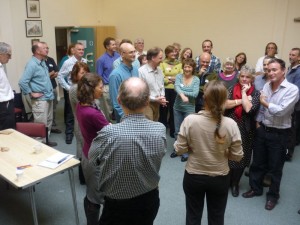 After lunch, a ‘mapping’ exercise was conducted, which invited people to position where they were on a continuum between “I think the Big Society is gorgeous and we should embrace it passionately” to, at the other extreme, “it is a foul abomination which we ought to have nothing to do with”. First we mapped this locally, and then nationally. It showed that, in terms of local initiatives, there was a greater appetite for local engagement rather than national engagement. At the national level, a large majority were in favour of some sort of engagement, but a critical one, rather than simply ignoring it.
After lunch, a ‘mapping’ exercise was conducted, which invited people to position where they were on a continuum between “I think the Big Society is gorgeous and we should embrace it passionately” to, at the other extreme, “it is a foul abomination which we ought to have nothing to do with”. First we mapped this locally, and then nationally. It showed that, in terms of local initiatives, there was a greater appetite for local engagement rather than national engagement. At the national level, a large majority were in favour of some sort of engagement, but a critical one, rather than simply ignoring it.
From this, people were asked if they had any especially vivid questions that they wanted to then pursue further in a focused discussion. This led to 8 questions which were pored over at 8 different tables. At the end, each table fed back its findings, which I have tried to summarise below.
The first group looked at what a clear narrative would look like. It said that it felt there was a danger in our ending up being tarred with the same brush as the Big Society. Transition, they argued, does need to respond somehow, and have some publicly expressed view. They identified the need for a manifesto, containing the fundamental aims of Transition, the outcomes sought, an analysis/critique of the Big Society, a decision about how to disseminate the findings which is then consulted on by the wider Transition Network and kept as a live, evolving document. Local initiatives could be encouraged to debate it on an ongoing basis.
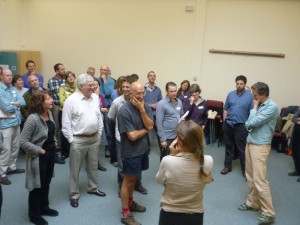 The second group looked in a similar way as to how to move forward. They felt that the idea of a ‘Full Engagement’ – ‘No Engagement’ spectrum was missing the point. Rather it is a circle with lots of points on it, where anything we do other than ignoring it is engagement of some sort. The concern is that a half-hearted response is ignoring it by default, any response from Transition Network needs to be done professionally, and needs to be done now. They set out two stages, the first requiring Transition Network to take on extra people, was to prepare a report (like that set out by the preceding group), expanding into policy work, providing daily critiques and responses to emerging statements from government and publicising that, and the second looking at engaging with local authorities. This needs funding, they acknowledged, but to not do it is to, by default, ignore the Big Society.
The second group looked in a similar way as to how to move forward. They felt that the idea of a ‘Full Engagement’ – ‘No Engagement’ spectrum was missing the point. Rather it is a circle with lots of points on it, where anything we do other than ignoring it is engagement of some sort. The concern is that a half-hearted response is ignoring it by default, any response from Transition Network needs to be done professionally, and needs to be done now. They set out two stages, the first requiring Transition Network to take on extra people, was to prepare a report (like that set out by the preceding group), expanding into policy work, providing daily critiques and responses to emerging statements from government and publicising that, and the second looking at engaging with local authorities. This needs funding, they acknowledged, but to not do it is to, by default, ignore the Big Society.
The third group looked at social enterprise. They felt that this was a key area, that Transition initiatives need to start forging links with social enterprises in their areas. There needs to be a clarity of guidelines, policies and values, and agreement about the kinds of organisations initiatives are happy to partner with. This would be one of the key building blocks of a narrative. Perhaps we might look at sharing approaches and stories, one idea was to produce a series of 2 minute quick videos of Transition-related social enterprises around the country and the difference they are creating.
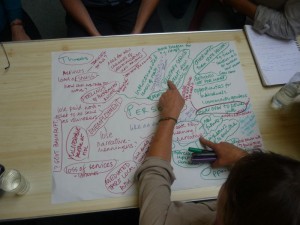 The fourth focused on Trusts, particularly on funding bodies. One suggestion was for a 3 month survey about how Transition and the Big Society agenda might overlap. Another was for Trusts to look at moving their investments, often presently in not especially ethical funding funds, into Transition initiative investments, such as wind energy and development projects, with the aim that in, say 5 years, all of their investments being invested in Transition infrastructure nationally. Another idea was a revolving loan fund that could enable a group to borrow against the amount on the condition that it is then lent to another initiative..
The fourth focused on Trusts, particularly on funding bodies. One suggestion was for a 3 month survey about how Transition and the Big Society agenda might overlap. Another was for Trusts to look at moving their investments, often presently in not especially ethical funding funds, into Transition initiative investments, such as wind energy and development projects, with the aim that in, say 5 years, all of their investments being invested in Transition infrastructure nationally. Another idea was a revolving loan fund that could enable a group to borrow against the amount on the condition that it is then lent to another initiative..
The fifth looked at issues of social justice. It suggested that given that Transition is political (albeit with a small ‘p’), perhaps it might twin Transition initiatives that are doing well with other emergent initiatives in more struggling communities. They noted that the Transition values of resilience, inclusion and localism need to have a wider resonance than they presently have, which could partly be achieved by sharing Transition stories in a way that has more traction in vulnerable communities, not online, but in person or on video, so as to be more accessible.
The sixth group proposed a bolt-on simulation exercise for change literacy, which they went off with the intention of developing separately. The seventh looked at the role of Local Entreprise Partnerships, and the need to improve governance to better enable them to spot oncoming crises as well as how to deal with inequalities. The final group looked at what to do when governments go bust, and proposed developing a workshop on the subject which it would then pilot.
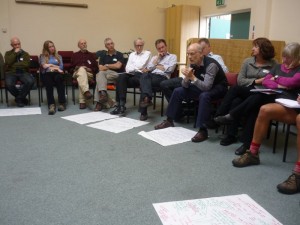 The day drew to a close with an opportunity to offer feedback on the day. One person suggested that it would be useful for individual initiatives to start discussions on these subjects at the local level. Another, who had been to many meetings about the Big Society said that it was by far the most useful and interesting one he had yet attended. A comment was made that this had been a very necessary discussion, which was very positive and represented the Transition movement growing up, and that we should do more things like this. There was also a suggestion that this was a workshop that could go on the road to different places, and that voluntary development agencies should also be invited along. The final comment noted the danger of this becoming a huge distraction for the Transition movement, distracting us from what we should be doing.
The day drew to a close with an opportunity to offer feedback on the day. One person suggested that it would be useful for individual initiatives to start discussions on these subjects at the local level. Another, who had been to many meetings about the Big Society said that it was by far the most useful and interesting one he had yet attended. A comment was made that this had been a very necessary discussion, which was very positive and represented the Transition movement growing up, and that we should do more things like this. There was also a suggestion that this was a workshop that could go on the road to different places, and that voluntary development agencies should also be invited along. The final comment noted the danger of this becoming a huge distraction for the Transition movement, distracting us from what we should be doing.
And that, then, was that. People headed off out into the evening to catch trains or to head to a local hostelry to continue conversations and to deepen connections. I found it a very useful day, well facilitated and insightful. The group of people who came together brought diverse pieces of the puzzle which hung together in a very useful way. Conclusions? My sense was that nationally the thinking was that some kind of input would be useful, but as a stating of what the Big Society ought to be, a telling of a more useful counter-narrative. Locally the sense was the inevitably initiatives would find themselves engaging critically with some aspects of this, but not ‘endorsing’ it as such. For Transition Network, my sense was that the next step might be some kind of Transition take on the Big Society document…. but the one thing that most people agreed on was that something so far-reaching and potentially either constructive or deeply damaging ought not be ignored.
Our deepest gratitude to everyone who travelled to the meeting, and to those who organised it, especially Ed and Sasha, and to Pear Catering’s wonderful lunch.
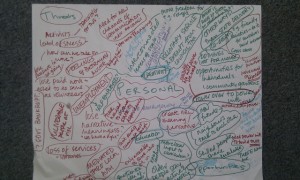
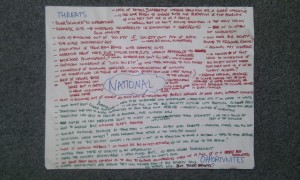
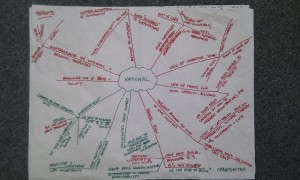
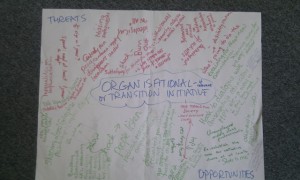
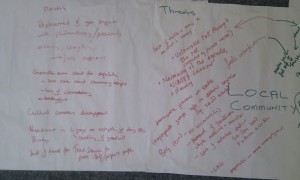
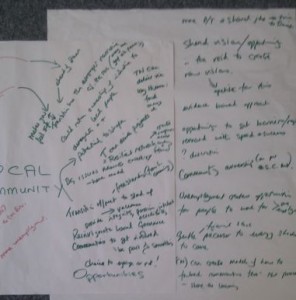
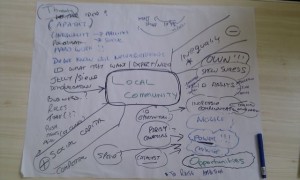
JTM
30 Sep 5:44pm
Thanks for this Rob, sounds like you all had a really useful day.
Here in Suffolk, where the County Council is planning to ‘divest’ itself of service provision and become an ‘enabling’ council employing 3 or 4 hundred contract managers working with social enterprises, co-ops and the private sector, we’re finding ourselves very much drawn into conversations we’re probably really not equipped to have yet and being held up as a shining example of community engagement completely out of context…
As you suggest, it would probably good for Suffolk groups to get together and think about what the Big Society will mean locally.
Mandy
1 Oct 9:30am
Interesting idea to come up with an alternative “manifesto” that we think would actually work.
Something similar here: http://www.newint.org/features/web-exclusive/2010/01/14/faster-than-the-oceans/
Neil Chadborn
2 Oct 2:30pm
Thanks Rob for this important update. I am involved in setting up a social enterprise and have been actively searching for the Big Society Bank etc in Liverpool – one of the vanguard areas… to no avail so far. One of my main frustrations at the mo. is the amount of ‘consultancy’ that goes on; siphoning off a large amount of the money that should be going directly to the community. With less involvement of the council this system is likely to expand, with even less money filtering through to ‘grass-roots’. I do think transition should promote social enterprise, but it should also strongly promote accountability and local democratic involvement. This may require careful limitations of corporate interest, while welcoming their involvement.
Richard
8 Oct 1:03am
Fascinating post, thank you for taking the time to record and write about it all.
Seems to me that the issues identified here are exactly the kind of nitty-gritty detail that ministers should be pressed to provide answers and information about rather than just their usual habit of broad philosophical statements.
Gill W
9 Oct 8:25pm
What about a Transition Bank. Could we do it ourselves? Foster social enterprise etc. Use national money but open to link with local money?
Susan
25 Oct 7:08pm
I had just read about Big Society in the New Yorker and was wondering how Transition was responding to it. What a wonderfully engaged and thoughtful response! It struck me that Transition is thriving so well in the UK that national government has caught wind of it and is copying the template (!) hoping to divest itself of expensive responsibilities. The threats were duly noted: corporate encroachment, strong-arming by vocal minorities, abandonment of needed programs. The funds seeding the Big Society Bank, unclaimed personal accounts, says a lot about where their heads are at –not government money. Opportunities are there too, after all Transition is about localization. So does that mean Big Society will sponsor bills favoring Small is Beautiful over Corporate Behemoths? Without funding, government only has favorable regulation to offer. Transition’s core message about creating alternative local economies to prepare for peak oil and mitigate climate change is too rad for the mainstream so far. Yet it has created an excellent framework to step in to local (and national) governance as a large P political party if it wants to do that in future. Perhaps Transition’s framework has caught national attention ahead of its message. Big Society may fizzle out. But right now it represents a nice challenge for Transition to further define itself by responding to the government’s narrative, and possibly redirecting it, by means of the excellent suggestions made by participants in the event in Bristol. Bravo.
Steve
26 Oct 4:44pm
As TBS doesn’t acknowledge the need to increase resilience to the impacts of peak oil or climate change I fail to see how Transition can meaningfully engage with it. Is Transition in danger of being distracted by this concept or am I missing something subtle?
Susan
27 Oct 4:36pm
I found some legislative strategies to promote localization I wanted to share. Perhaps Transition could propose these steps if it chooses to address national matters in response to Big Society:
Preface: “Although strengthening local economies depends upon bottom-up development and widespread participation at the local level, the wider policy environment is equally as important. Current grassroots efforts to ‘go local’ are hampered by national and international policies geared towards encouraging comparative advantage in a liberalised global economy. To allow this marginalised movement to reach the mainstream clearly requires a wholesale shift in the priorities of economic policy-making.
As the specific conditions for encouraging locally-oriented business vary from country to country, the recommendations listed here are necessarily broad. These are but the first steps in creating an alternative economic framework in which sustainable, resilient local economies can flourish:
1.Internalise environmental costs of production and transport to provide the right kinds of incentives for more efficient and environmentally-friendly local forms of production and consumption in a range of industries. This can be achieved through ecological tax reform and/or pricing mechanisms for the use of natural resources and ecosystem services, as well as the removal of public subsidies for fossil-fuel-intensive energy, transport and agriculture.
2.Renegotiate international trade and finance rules so that their end goal is the regeneration of diversified local economies. Trade agreements should be guided by the principles of subsidiarity, sustainability and sufficiency, thereby reducing the negative environmental and social ‘externalities’ associated with globalisation.
3.Facilitate the introduction of local currencies and the set up of local banking and micro-finance institutions to encourage long-term investment at a local level. This can help provide the necessary financial assistance that small businesses require to set up and operate.
4.Introduce and enforce rigorous anti-trust legislation to break up concentrations of corporate power and encourage local competition among small businesses.
5.Develop alternative indicators of progress, beyond GDP, that incorporate measures of well-being and sustainability.
A new path of development
For many people, the motivation to rebuild local economies goes beyond practical concerns about economic stability and sustainability. It is rooted in a deep dissatisfaction with the lifestyle promoted by an economic system that globalises production and consumption, placing profit and efficiency above local participation and community. By actively discriminating in favour of diverse and resilient local economies, the governments of the Commonwealth can set their countries on a new path of development – one that fosters human flourishing and safeguards the planet for future generations.”
A version of this article appeared in the Commonwealth Finance Ministers Meeting Reference Report 2010.
This work is licensed under Creative Commons.
Anna White is a policy analyst at Share The World’s Resources. She can be contacted at anna(at)stwr.org.